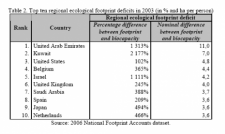Trade human ecological footprint, create fuel-innovation fund
EU observer has an article on France backing European Commission idea to tax exports from countries that are heavy polluters. A quote:
” France has thrown its support behind a European Commission idea to tax environment polluters and also urged Brussels to consider EU levies for imports from non-Kyoto countries, such as the US and Australia.
“We need to profoundly revise all of our taxes… to tax pollution more, including fossil fuels, and to tax labour less,” French president Nicolas Sarkozy told an environment forum representing government, industry and the green lobby on Thursday (25 October), according to AFP agency. “
In a recent paper (Opala, Rybinski, 2007 ) we argue that it is good idea to introduce proper incentives to ensure that world trade takes into account ecological considerations. A quote:
“The consequences of further ecological unsustainability may be catastrophic, so corrective and preventive actions are needed. First, incoming changes in the field of energy production provide opportunity to significantly reduce pollution. It is necessary however to promote those technologies and ideas which guarantee achieving sustainable development, i.e. satisfy human needs under the condition of environmental protection. Second, more restrictive international agreements on pollution reduction must be adopted and implemented. One of “Alexandrian” ideas of achieving sustainability may be to trade human ecological footprint deficits and surpluses between countries, regions and enterprises. It could bring the market pricing mechanism to the environmental aspect of production and thus eliminate the problem of market failure in this area. In effect it would contribute to an increase in ecological efficiency of production.”
We also show countries with the highest ecological footprint deficit per capita, see below:
Another idea that I have been postulating for some time now is creating a n-billion euro fund (n>=1) that would go to the team or researchers that create cost-efficient car that can run on something clean, that will replace gasoline (hydrogen, something else). With such incentives the outcome could be very fast (assuming there is political will to go ahead). This would be one of the cheapest-ever ways to reduce world addiction to fossil fuels. We owe it to the future generations.
